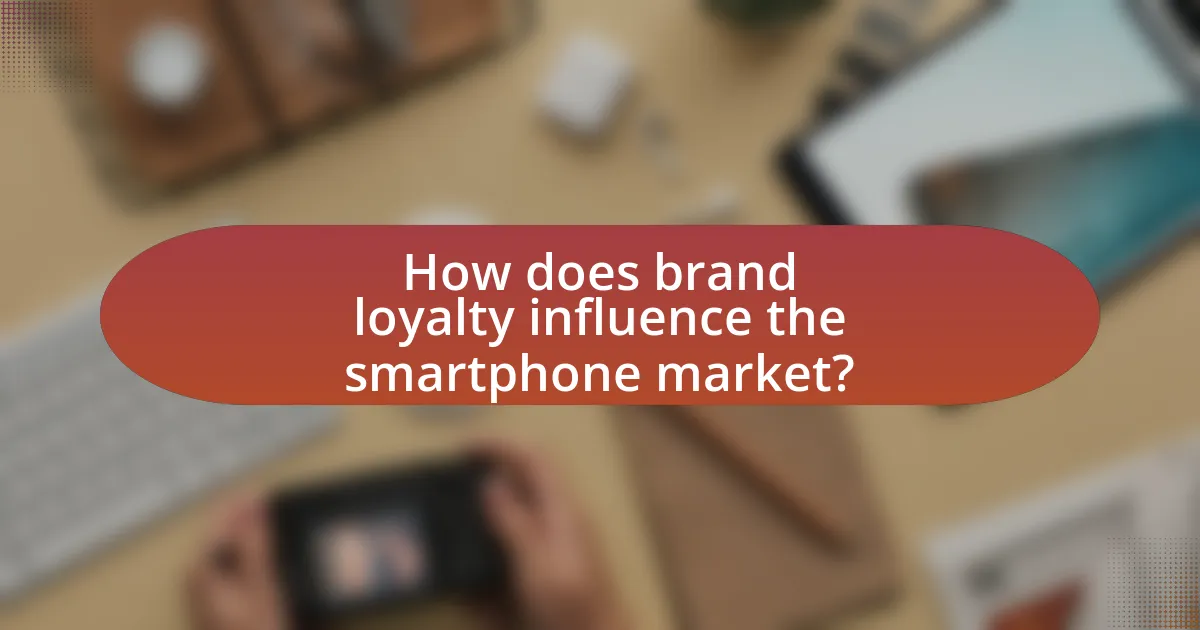Brand loyalty plays a crucial role in shaping the dynamics of the smartphone market by influencing consumer purchasing behavior, market share, and pricing strategies. High levels of brand loyalty, particularly seen with companies like Apple and Samsung, lead to repeat purchases and a willingness among consumers to pay premium prices for their preferred devices. Factors such as product quality, brand reputation, customer service, and ecosystem integration contribute to this loyalty, while effective marketing strategies and social media engagement further enhance customer retention. The article explores how brand loyalty affects sales, revenue, and competition among smartphone manufacturers, as well as the long-term implications for consumer behavior and brand advocacy.

How does brand loyalty influence the smartphone market?
Brand loyalty significantly influences the smartphone market by driving repeat purchases and shaping consumer preferences. Loyal customers are more likely to choose their preferred brand over competitors, which can lead to increased market share for that brand. For instance, a study by Statista in 2021 indicated that 92% of Apple users expressed loyalty to the brand, resulting in a substantial portion of the smartphone market being dominated by Apple and Samsung. This loyalty not only affects sales but also impacts pricing strategies, as loyal customers may be willing to pay a premium for their preferred brand, thereby allowing companies to maintain higher profit margins.
What factors contribute to brand loyalty in the smartphone industry?
Brand loyalty in the smartphone industry is primarily influenced by product quality, brand reputation, customer service, and ecosystem integration. High product quality ensures reliability and performance, which fosters trust among consumers. A strong brand reputation, often built through effective marketing and positive user experiences, enhances consumer perception and preference. Excellent customer service contributes to satisfaction and retention, as consumers are more likely to remain loyal to brands that address their needs effectively. Additionally, ecosystem integration, where devices and services work seamlessly together, encourages users to stay within a brand’s offerings, reinforcing loyalty. For instance, Apple’s ecosystem, which includes iPhones, iPads, and MacBooks, creates a cohesive user experience that significantly boosts brand loyalty.
How do consumer perceptions shape brand loyalty?
Consumer perceptions significantly shape brand loyalty by influencing how customers view a brand’s value, quality, and reliability. Positive perceptions, such as high product quality and effective customer service, lead to increased trust and emotional attachment to the brand, which fosters loyalty. Research indicates that 64% of consumers cite shared values as the primary reason for a strong brand relationship, highlighting the importance of aligning brand messaging with consumer beliefs. Additionally, brands that consistently meet or exceed consumer expectations tend to cultivate a loyal customer base, as evidenced by a study from Bain & Company, which found that increasing customer retention rates by just 5% can increase profits by 25% to 95%. Thus, consumer perceptions directly impact brand loyalty through trust, emotional connection, and value alignment.
What role does product quality play in fostering brand loyalty?
Product quality is a critical factor in fostering brand loyalty, as high-quality products meet customer expectations and enhance satisfaction. When consumers perceive a product as reliable and effective, they are more likely to develop a positive emotional connection with the brand, leading to repeat purchases. Research indicates that 70% of consumers are willing to pay more for a product from a brand known for its quality, demonstrating that product quality directly influences purchasing decisions and brand allegiance. Furthermore, brands that consistently deliver high-quality products often benefit from positive word-of-mouth, which can further solidify customer loyalty and attract new customers.
Why is brand loyalty important for smartphone manufacturers?
Brand loyalty is crucial for smartphone manufacturers because it directly influences repeat purchases and customer retention. When consumers develop a strong attachment to a brand, they are more likely to choose that brand for future purchases, reducing marketing costs and increasing profitability. For instance, a study by Bain & Company found that increasing customer retention rates by just 5% can lead to an increase in profits of 25% to 95%. This demonstrates that brand loyalty not only secures a stable customer base but also enhances financial performance, making it a vital component of competitive strategy in the smartphone market.
How does brand loyalty affect sales and revenue?
Brand loyalty significantly boosts sales and revenue by fostering repeat purchases and encouraging customer retention. Loyal customers are more likely to choose a brand over competitors, leading to increased market share. For instance, a study by Bain & Company found that increasing customer retention rates by just 5% can lead to profit increases of 25% to 95%. This demonstrates that brand loyalty not only drives consistent sales but also enhances overall profitability, as loyal customers tend to spend more over time and are less price-sensitive.
What impact does brand loyalty have on market share?
Brand loyalty significantly enhances market share by fostering repeat purchases and customer retention. When consumers consistently choose a specific brand over competitors, it leads to a stable customer base, which directly contributes to increased sales volume. For instance, a study by Bain & Company found that a 5% increase in customer retention can lead to a 25% to 95% increase in profits, illustrating the financial benefits of brand loyalty. Additionally, brands with high loyalty often enjoy a competitive advantage, as loyal customers are less likely to switch to alternatives, thereby solidifying the brand’s position in the market.
How do marketing strategies enhance brand loyalty?
Marketing strategies enhance brand loyalty by creating emotional connections and consistent customer experiences. These strategies, such as personalized marketing, loyalty programs, and effective communication, foster trust and engagement with consumers. For instance, a study by the Harvard Business Review found that emotionally connected customers are more than twice as valuable as highly satisfied customers, indicating that emotional engagement drives loyalty. Additionally, brands that implement loyalty programs see an increase in repeat purchases; according to a report by Bond Brand Loyalty, 79% of consumers are more likely to continue doing business with brands that have a loyalty program. Thus, effective marketing strategies not only attract customers but also cultivate long-term loyalty through meaningful interactions and rewards.
What types of promotions are most effective in building loyalty?
Loyalty-building promotions that are most effective include rewards programs, personalized offers, and exclusive access to products or services. Rewards programs incentivize repeat purchases by offering points or discounts, which research shows can increase customer retention by up to 30%. Personalized offers, tailored to individual customer preferences, enhance engagement and satisfaction, leading to a 20% increase in loyalty. Exclusive access promotions create a sense of belonging and urgency, driving brand attachment and repeat business. These strategies are supported by studies indicating that brands employing such promotions experience significantly higher customer loyalty metrics compared to those that do not.
How does social media engagement influence brand loyalty?
Social media engagement significantly enhances brand loyalty by fostering direct communication and community building between brands and consumers. When brands actively engage with their audience through social media platforms, they create a sense of belonging and trust, which are critical components of loyalty. According to a study published in the Journal of Brand Management, brands that interact with customers on social media see a 20% increase in customer retention rates. This interaction not only allows brands to respond to customer inquiries and feedback promptly but also enables them to share valuable content that resonates with their audience, further solidifying the emotional connection.

What are the consequences of brand loyalty on market dynamics?
Brand loyalty significantly influences market dynamics by creating a stable customer base that reduces price sensitivity and enhances competitive barriers. When consumers exhibit strong loyalty to a brand, they are less likely to switch to competitors, allowing the brand to maintain higher prices and market share. For instance, Apple has consistently demonstrated this with its loyal customer base, which contributes to its ability to command premium pricing and sustain profitability despite competitive pressures. Additionally, brand loyalty can lead to increased word-of-mouth marketing, further solidifying a brand’s position in the market. Research indicates that loyal customers are more likely to recommend their preferred brands, amplifying their market presence and influencing new customer acquisition.
How does brand loyalty affect competition among smartphone brands?
Brand loyalty significantly enhances competition among smartphone brands by creating a dedicated customer base that prefers specific brands over others. This loyalty leads to reduced price sensitivity, allowing brands to maintain higher prices and margins, as loyal customers are less likely to switch to competitors even when faced with lower-priced alternatives. For instance, Apple has consistently demonstrated strong brand loyalty, resulting in a market share that allows it to command premium pricing, with 2022 data showing that 50% of iPhone users planned to upgrade to a new iPhone, indicating strong retention. Consequently, brands with high loyalty can invest more in marketing and innovation, further intensifying competition as they strive to attract new customers while retaining existing ones.
What strategies do brands use to retain loyal customers?
Brands use personalized communication and rewards programs as key strategies to retain loyal customers. Personalized communication involves tailoring messages and offers based on customer preferences and behaviors, which enhances customer engagement and satisfaction. For instance, a study by McKinsey found that personalized experiences can lead to a 10-15% increase in customer retention rates. Rewards programs incentivize repeat purchases by offering discounts, exclusive access, or points redeemable for future purchases, effectively encouraging ongoing loyalty. According to a report by Bond Brand Loyalty, 79% of consumers are more likely to continue doing business with brands that offer loyalty programs. These strategies create a sense of value and connection, fostering long-term relationships between brands and their customers.
How does brand loyalty influence pricing strategies?
Brand loyalty significantly influences pricing strategies by allowing companies to set higher prices due to the perceived value and trust associated with their brand. When consumers are loyal to a brand, they are often willing to pay a premium for its products, as evidenced by Apple’s pricing strategy, where loyal customers consistently purchase iPhones at higher price points compared to competitors. This loyalty reduces price sensitivity, enabling brands to maintain or increase margins while still attracting repeat purchases. Research indicates that brands with strong loyalty can command prices that are, on average, 20% higher than those of less favored competitors, demonstrating the direct correlation between brand loyalty and pricing power.
What are the long-term effects of brand loyalty on consumer behavior?
The long-term effects of brand loyalty on consumer behavior include increased repeat purchases, reduced price sensitivity, and enhanced customer advocacy. Consumers who exhibit brand loyalty are more likely to consistently choose the same brand over competitors, leading to a stable revenue stream for the brand. Research indicates that loyal customers are less likely to switch to alternative brands even when faced with price increases, demonstrating reduced price sensitivity. Additionally, loyal consumers often become brand advocates, promoting the brand through word-of-mouth, which can significantly influence potential customers. A study by Kumar and Shah (2004) in the Journal of Marketing found that loyal customers can contribute up to ten times more revenue than new customers over their lifetime, underscoring the substantial impact of brand loyalty on consumer behavior.
How does brand loyalty impact repeat purchases?
Brand loyalty significantly increases the likelihood of repeat purchases. When consumers develop a strong attachment to a brand, they are more inclined to choose that brand over competitors, leading to consistent buying behavior. Research indicates that loyal customers are 60-70% more likely to repurchase from the same brand, as highlighted in a study by the Harvard Business Review, which emphasizes that acquiring a new customer can cost five times more than retaining an existing one. This loyalty not only drives repeat purchases but also fosters long-term customer relationships, ultimately enhancing a brand’s market position in the competitive smartphone industry.
What role does brand loyalty play in customer advocacy?
Brand loyalty significantly enhances customer advocacy by fostering a strong emotional connection between consumers and brands. This loyalty leads customers to actively promote and recommend the brand to others, often resulting in positive word-of-mouth and increased trust among potential buyers. Research indicates that loyal customers are 50% more likely to recommend a brand to friends and family, demonstrating the direct correlation between loyalty and advocacy. Furthermore, brands with high loyalty levels often enjoy a competitive advantage in the market, as advocates can influence purchasing decisions and contribute to sustained growth.

How can brands cultivate and maintain loyalty in the smartphone market?
Brands can cultivate and maintain loyalty in the smartphone market by consistently delivering high-quality products, providing exceptional customer service, and fostering a strong community around their brand. High-quality products ensure customer satisfaction and reduce the likelihood of returns, as seen in Apple’s high customer retention rates, which are around 90%. Exceptional customer service, such as timely support and easy repair processes, enhances the overall user experience, leading to repeat purchases. Additionally, creating a community through brand engagement initiatives, like exclusive events or online forums, strengthens emotional connections with customers, as demonstrated by Samsung’s successful Galaxy community. These strategies collectively reinforce brand loyalty and drive sustained market presence.
What best practices can smartphone brands implement to enhance loyalty?
Smartphone brands can enhance loyalty by implementing personalized customer experiences. Personalization fosters a deeper connection between the brand and the consumer, leading to increased satisfaction and repeat purchases. For instance, brands that utilize data analytics to tailor marketing messages and product recommendations have seen a significant rise in customer retention rates. According to a study by McKinsey, companies that excel in personalization can achieve up to 10-15% higher revenue growth compared to their competitors. Additionally, offering robust customer support and engaging in community-building initiatives can further solidify brand loyalty, as consumers are more likely to remain loyal to brands that actively listen to and address their needs.
How can brands leverage customer feedback to improve loyalty?
Brands can leverage customer feedback to improve loyalty by actively soliciting, analyzing, and implementing changes based on that feedback. By creating channels for customers to share their experiences, such as surveys or social media interactions, brands can gather valuable insights into customer preferences and pain points. For instance, a study by Bain & Company found that companies that excel in customer experience can increase customer retention rates by 10-15%. This data-driven approach allows brands to tailor their products and services to better meet customer needs, fostering a sense of loyalty. Additionally, responding to feedback demonstrates to customers that their opinions are valued, which can enhance emotional connections and encourage repeat business.
What role does after-sales service play in maintaining brand loyalty?
After-sales service is crucial in maintaining brand loyalty as it directly influences customer satisfaction and retention. Effective after-sales support, such as timely repairs, responsive customer service, and comprehensive warranty policies, fosters trust and enhances the overall customer experience. Research indicates that 70% of customers remain loyal to brands that provide excellent after-sales service, highlighting its impact on repeat purchases and positive word-of-mouth. This loyalty is particularly significant in the smartphone market, where consumers often seek reliable support for their devices, reinforcing their commitment to brands that prioritize customer care.
What challenges do brands face in building loyalty?
Brands face several challenges in building loyalty, including intense competition, changing consumer preferences, and the need for consistent engagement. Intense competition in the smartphone market leads to price wars and innovation races, making it difficult for brands to differentiate themselves and retain customer loyalty. Changing consumer preferences, driven by technological advancements and shifting values, require brands to adapt quickly to meet evolving expectations. Additionally, maintaining consistent engagement through personalized marketing and customer service is crucial, as failure to do so can result in diminished loyalty. According to a study by Bain & Company, increasing customer retention rates by just 5% can increase profits by 25% to 95%, highlighting the importance of overcoming these challenges to foster brand loyalty effectively.
How can brands overcome negative perceptions to build loyalty?
Brands can overcome negative perceptions to build loyalty by actively engaging in transparent communication and demonstrating consistent quality improvements. For instance, companies like Samsung have faced criticism over product issues but have successfully rebuilt trust through public apologies, product recalls, and enhanced customer service initiatives. Research indicates that 70% of consumers are more likely to remain loyal to brands that acknowledge their mistakes and take corrective actions. By fostering open dialogue and showing commitment to customer satisfaction, brands can effectively transform negative perceptions into positive loyalty.
What strategies can brands use to adapt to changing consumer preferences?
Brands can adapt to changing consumer preferences by implementing data-driven market research, enhancing customer engagement, and personalizing product offerings. Data-driven market research allows brands to identify emerging trends and shifts in consumer behavior, enabling them to adjust their strategies accordingly. For instance, a study by McKinsey found that companies using advanced analytics to understand consumer preferences can increase their revenue by 10-15%. Enhancing customer engagement through social media and direct feedback channels fosters a deeper connection with consumers, allowing brands to respond quickly to their needs. Additionally, personalizing product offerings based on consumer data can significantly improve customer satisfaction and loyalty, as evidenced by a report from Epsilon, which states that 80% of consumers are more likely to make a purchase when brands offer personalized experiences.
What are the key takeaways for brands aiming to boost loyalty?
To boost loyalty, brands should focus on delivering exceptional customer experiences, fostering emotional connections, and maintaining consistent communication. Exceptional customer experiences can be achieved through personalized services and responsive support, which have been shown to increase customer retention rates by up to 30%. Fostering emotional connections involves understanding customer values and aligning brand messaging accordingly, as studies indicate that emotionally connected customers are 52% more valuable than those who are just satisfied. Consistent communication, including regular updates and engagement through various channels, reinforces brand presence and trust, leading to a 20% increase in customer loyalty.




